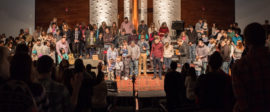Course Modules in Worship and Liturgy - More Ideas for Assignments on Work
Seminary Curriculum / Produced by TOW Project
Here are more sample assignments to help inspire fresh thinking about how to incorporate a concern for vocation, flourishing and economic justice in a seminary course on Worship, Liturgy, and Church Music.
Work-Themed Worship Service
Have students prepare a worship service centered on a work- or vocation-related theme. Include scripture readings, hymns, prayers and other liturgical resources, and the outline of a potential sermon. For those traditions which require set scripture readings for various Sundays, students can work with a particular set of Sunday lessons that is congenial to being adapted in this fashion.
For inspiration, see sample services with work themes in from David Welbourn's book Work in Worship.
Earh and Heaven Separated by Song
Ask students to list ten hymns or songs, preferably from their own traditions, that emphasize discontinuity between earth and heaven, or between our current work and the new creation, with explanations. Then ask them to list ten (if they can!) which affirm the holy in the everyday and a continuity between our work and the new creation, with explanations. Possibly, follow this up by asking students to attempt to compose lyrics to a new hymn or song affirming an aspect of work or creation.
For practical examples of hymnody, see the TOW Project page on worship ideas related to work.
Here are more sample assignments to help inspire fresh thinking about how to incorporate a concern for vocation, flourishing and economic justice across the curriculum.
Commissioning Service
Ask students to design a commissioning service by which a church could commission a believer upon entering into a specific type of occupation (teachers, nurses, artists, construction workers, secretaries, fast-food workers, parents, retirees…the list is endless!). The service should be
- appropriate to the student’s tradition
- biblically and theologically based
- inclusive of prayer, scripture and music.
For students from traditions with set liturgies, assign them to find the appropriate resources in their liturgical materials for putting together such a service.
If possible, ask the students to use the service in the field and reflect on the results.
For more on how a possible service could work, read the article Commissioning Our People for the Workplace and take a look at a service for commissioning an Industrial Chaplain.
Daily Commute as Liturgy
Ask students to respond to “The Work of My Hands,” a liturgy for daily commutes by A New Liturgy.
- What elements of worship and prayer (praise, intercession, confession, etc.) do the creators include in their liturgy for commuters?
- Why do you think they include each element?
- How does this liturgy prepare people for work and for coming home from work?
- Are there things you think could be added?
- How could you see something like this being used in your own setting?
Critique Available Worship Resources
Ask students to respond to one chapter of the book Work in Worship, available at the TOW Project. These include prayers, readings, sermons, hymns and sample services.
- What theology of work and/or vocation is taught by your chosen set of resources?
- Are there things your chosen resources leave out? Are there emphases that surprise you?
- What theology of work and/or vocation do you need to teach your congregation?
- Develop an adaptation of one of these resources for use in your setting. Be able to explain why you made the changes you did.
Very Common Prayer
Ask students to respond to the article “Blessing our Pets – and More” by Pam Tinsley and the accompanying Weekly Prayer Cycle for vocations by Demi Prentiss and Fletcher Lowe.
- What insights can be gained from this article for designing worship that focuses on the “Monday through Saturday self”?
- What might you add to or subtract from the prayer cycle for your particular situation? How could you incorporate these or similar prayers into your weekly worship?
Work in Contemporary Song
Ask students to respond to one of the songs on work from the Porter’s Gate Worship Project.
- What theological principles are taught by the song?
- What are some Scriptural passages referenced explicitly or implicitly by the song?
- How well does the song capture the experience of the workplace?
- How could the song best be used in worship?










